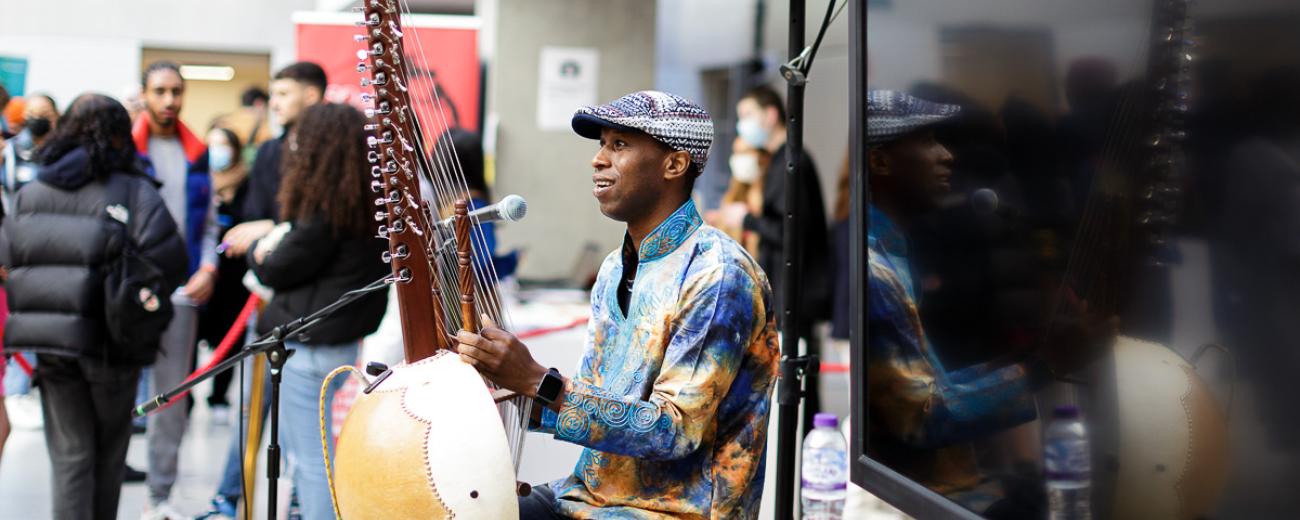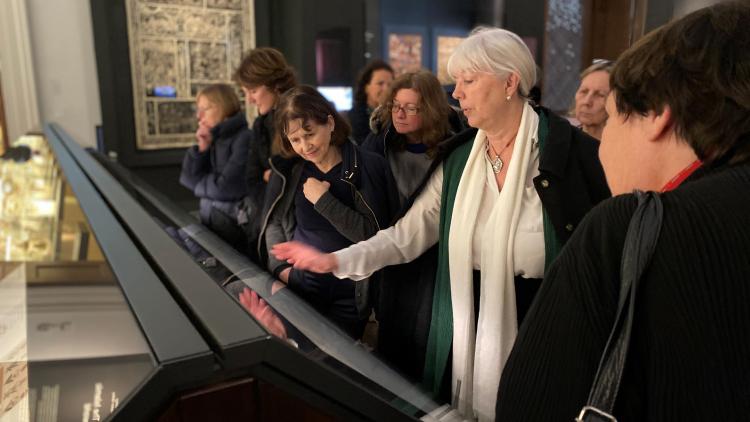MPhil/PhD in Music


Key information
- Duration
- 4 years
- Attendance mode
- Full-time or part-time
- Location
- On campus
- Fees
-
Home (full-time): £4,860 per year
International (full-time): £23,390 per year - Entry requirements
-
Postgraduate students of the Department come from a wide variety of backgrounds in the UK and from overseas. Most are performers of music as well as researchers; applicants are evaluated individually on the basis of their background and academic achievements. Applicants should normally possess a Master’s degree, or equivalent, in Music, Ethnomusicology or other relevant discipline plus one reference. Applicants who are accomplished performers or teachers, or who work in the music industry, may have alternative qualifications, and are encouraged to apply. International applicants should also see Doctoral School English language requirements
Course overview
Staff and students of the Department of Music pursue research on a wide range of subjects, mainly but not exclusively focused on the music of Asia and Africa.
Staff have regional interests in the music of East and Central Asia (Harris), India and Pakistan (Williams), the Islamic Middle East (Saeid Kordmafi) and Jewish world (Webster-Kogen), and South and East Africa (Impey). However research is not limited to these areas: projects have been undertaken on American jazz, and on Caribbean, Mediterranean and Eastern European music, for example. Staff often have research interests in issues that cross regional boundaries; see the Department Staff page for a summary of their interests, and select the name of a lecturer for further details of their individual research specialisms and activities.
Whatever its regional origin, music is studied as a cultural phenomenon, and also from analytical and historical perspectives. Instrumental and vocal, sacred and secular, art and popular, traditional and modern musical forms are all of equal interest. Research methods employed include fieldwork, interview, archive research, recording and filming, performance, transcription and analysis, and composition.
The Department of Music at SOAS has been ranked best in the UK for research impact and 5th overall in the Research Excellence Framework (REF) 2021.
How to apply
If the subject you are thinking of researching coincides with the research interests of one or more members of academic staff, you are welcome to contact them to discuss your project before applying. If you are not sure how your projects fits in with the department’s subject coverage, or if you have any other question about the department or the research programme in general, you may contact the Research Tutor. When you are ready to apply, do so online.
In considering your application, the Registry will advise the department as to whether your academic qualifications meet the normal requirements for MPhil/PhD at SOAS, and whether you meet English language requirements. The Department will consider your background and experience more generally, your research proposal, and your references. We will pay particular attention to the following points:
- is your project one that can reasonably be completed within 4 years (or part-time equivalent), taking into account any difficulties there may be in working in particular parts of the world?
- do you have the appropriate subject knowledge and skills, or can these be provided at SOAS as part of your research training? (you may be recommended to take a Master’s degree first before commencing research)
- do you communicate effectively in written English?
- does your referee confirm that you have the ability to carry out this research?
- can the Department provide appropriate supervision?
Please ask your referee to note the questions on the reference form and respond to them as far as possible in their reference. Your referee should have personal knowledge of your academic and/or musical work (eg, performance, composition, etc.).
Residence requirements
MPhil/PhD students are required to be resident in London, with the following exceptions:
- In Year 2, you may spend up to 12 months overseas on fieldwork
- In Year 4, you may apply for permission to work away from SOAS (this does not affect your fees)
Part-present or Distance Learning research degrees are not currently available.
Structure
Year-by-year requirements for full-time research students
Year 1: research training and upgrade to PhD
Part-time students spend two years for every one year of the full-time scheme, except at the Continuation of Writing Up stage where only one year is allowed. For further information about research degrees at SOAS, see the Code of Practice for Research Degrees.
During Year one, the student refines the research proposal and decides in conjunction with his/her Supervisory Committee whether the research project should be directed towards the goal of an MPhil or a PhD degree. Students who wish to work towards the PhD must pass the process of upgrading registration from MPhil to PhD candidacy.
Upgrade requirements
A. Written submission
You must provide the following to the Supervisory Committee by the May deadline (exact date TBC by SOAS Registry):
An essay of not more than 12,000 words , comprising:
- an outline of the research topic, the specific questions to be addressed and the expected contribution of the study to the discipline.
- a review of the relevant theoretical and subject-specific literature.
- an outline of the methodology to be followed, including an outline of any fieldwork to be carried out, and of any performance or composition work to be submitted as a substantive part of the thesis.
- a summary of any original research investigation that you have already carried out that will contribute to the thesis.
- An initial Bibliography, comprising the literature directly relevant to the research, including non-text material where appropriate, set out according to standard bibliographical conventions.
- A provisional chapter-outline of the thesis. The title of each chapter should be accompanied by a short (1-paragraph) explanation of the subject matter.
- A short report on the research training that you have undertaken to date, the progress achieved, and any training that you will need in the next stage of your research.
- A brief (1-page) discussion of any considerations of research ethics that arise from the topic or the methodology proposed.
B. Oral presentation
Following submission of the above, you are required to give an oral presentation of 30 min duration, followed by discussion. This presentation will be attended by your Supervisory Committee. The presentation should include musical performance, and/or recordings of composition work, if these form an integral part of your research project. The Oral Presentation should include results of any research already undertaken, and plans for the next stage of research.
The Supervisory Committee will then discuss the Written Submission and Oral Presentation with you and make recommendations. The Supervisory Committee may ask you to revise or add to the Written Submission before upgrading is approved.
The date of the Oral Presentation will be arranged by the Research Tutor in consultation with your Supervisory Committee.
The Written Submission and the Oral Presentation should demonstrate to your Supervisory Committee:
- your ability to undertake PhD-level research, including the ability to exercise critical thought, adopt an analytical approach, and pursue original research
- satisfactory progress in research training;
- competence in written and spoken English;
- awareness of any relevant ethical issues.
Year 2: fieldwork or data collection
- If you spend more than 1 month in the field, a report must be submitted each month to your First Supervisor via email.
- You should aim to complete at least one further chapter in draft.
Year 3: completion of full draft
- Term 1: Required seminar presentation on outcome of fieldwork, or other work in Year 2, and its impact on your research project.
- Term1: Submission of a fieldwork report (3,000 words), OR the chapter(s) completed during Year 2, to your Supervisory Committee.
- Term 3: Submission of draft thesis by 1 September (date TBC) to your Supervisory Committee.
- The completed Extension of Writing-Up (Continuation) Form must be submitted to the Supervisory Committee; if the Committee is satisfied that the draft thesis can be developed into a thesis of a quality worthy for submission for examination in the subsequent academic year, the student will be allowed to register on Extension of Writing-up (Continuation) Status in Year 4 at reduced fees.
Teaching experience may be available in Year 2, 3 or 4, depending on the progress of your research and on Department needs. Consult your Supervisor and the Associate Head of Department.
Year 4: completion and submission of thesis
The completed thesis must be submitted for examination before the end of Year 4 (part-time, Year 7). Extensions beyond this date are granted only in exceptional circumstances.
Requirements
- The Examination Entry form must be completed, signed by your supervisor, and submitted to Registry at least 2 months before submission of the thesis.
- A Nomination of Examiners form must be submitted by your supervisor to the Research Tutor. This must be approved by the Department Research Committee and the Registry before the thesis can be sent to the examiners.
At your viva (thesis examination), the examiners aim to confirm that:
- the thesis is genuinely the work of the candidate
- the thesis forms a distinct contribution to the knowledge of the subject, and affords evidence of originality by:
(i) the discovery of new facts; and/or
(ii) the exercise of independent critical power - the thesis is satisfactory as regards literary presentation
- the thesis is of a standard to merit publication in whole or in part or in a revised form.
Important notice
The information on the website reflects the intended programme structure against the given academic session. The modules are indicative options of the content students can expect and are/have been previously taught as part of these programmes. However, this information is published a long time in advance of enrolment and module content and availability is subject to change.
Teaching and learning
Research training and coursework
All research students are required to follow a course of research training held in the department in their first year. In addition they may be required to take one or more postgraduate courses, such as the MMus core course Ethnomusicology in Practice, and/or a language course, depending on their prior qualifications and the requirements of their research project. They are also expected to attend department research seminars and they may be recommended to attend research training workshops elsewhere in SOAS, or in other institutions London-wide .
Supervision
Each research student is allocated a Supervisory Committee, comprising the First Supervisor, who will be primarily responsible for guiding the student’s research, and a Second Supervisor, who is available for periodic consultation. The Committee periodically assess the student’s progress. Research students are welcome to consult any members of the Department of Music about their research. Where the project is interdisciplinary, the Second Supervisor can be a member of another department.
Funding
For available sources of funding for research, see research scholarships. Students from outside the UK may be eligible for financial support from their country of origin.
SOAS Library
SOAS Library is one of the world's most important academic libraries for the study of Africa, Asia and the Middle East, attracting scholars from all over the world. The Library houses over 1.2 million volumes, together with significant archival holdings, special collections and a growing network of electronic resources.
Scholarships
Employment
Students in the School of Arts develop a critical and theoretically informed approach to global arts and culture. In addition to an intercultural awareness and practical expertise, graduates gain a wide portfolio of transferable skills which are especially sought after in the creative and cultural industries.
Recent graduates have been hired by:
- Professor of Ethnomusicology in RHUL
- KCL
- Durham University
- UCLA
- Xi'an Conservatory
- University of Vienna, University of Würzburg
- Head Curator of the World and Tradition Collections British Library Sound Archive
Find out about our Careers Service



